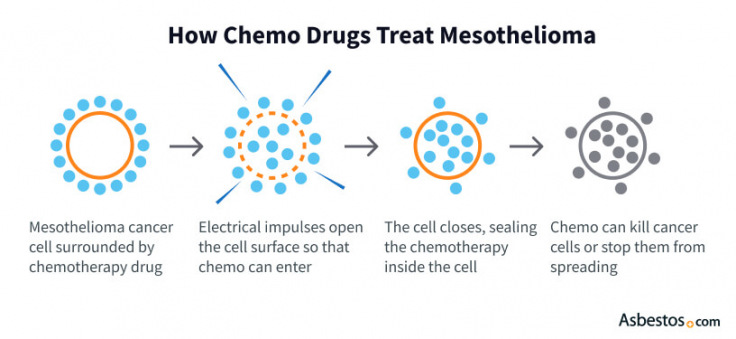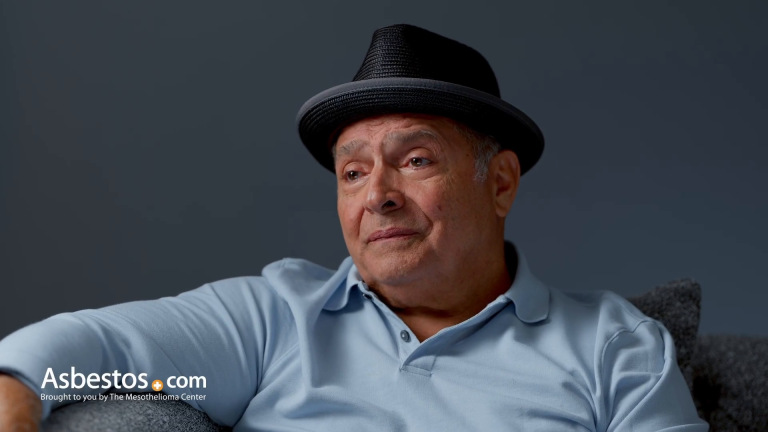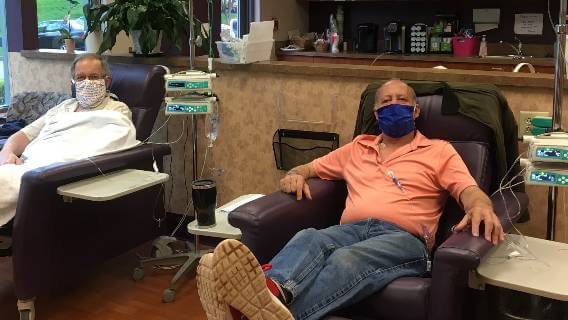
Connect with top-rated doctors specializing in mesothelioma treatment, who will personalize treatment options based on your diagnosis.
Find Your SpecialistChemotherapy for mesothelioma uses drugs like pemetrexed and cisplatin to kill cancer cells. Administered through IV every 21 days, it can shrink tumors, slow cancer, relieve symptoms and improve quality of life.
Chemotherapy drugs travel through the bloodstream to reach mesothelioma cancer cells. They enter these cells and damage the DNA or interfere with the cellular machinery that controls cell division and growth. This damage stops the cells from multiplying and triggers their death.
Key Facts About Chemotherapy for Mesothelioma
Doctors use chemo as an effective first-line treatment to kill mesothelioma cancer cells. However, the drugs can also harm healthy cells. The drugs you receive depend on your mesothelioma diagnosis.
Chemo is sometimes used with other targeted therapies to treat mesothelioma. Doctors also use chemo to reduce tumor size and relieve pressure-related symptoms.
“In general, chemotherapy drugs disrupt the division of cells that divide quickly. This prevents cancer cells from replicating and growing.”
Chemotherapy drugs treat mesothelioma by surrounding the cancer cells. Next, the drugs enter the cancer cells and damage the control center that makes the cells divide. Once the cells cannot divide and spread to other parts of the body, the chemotherapy drugs kill them.

Alimta is the standard chemo drug for mesothelioma. Doctors often give Alimta with cisplatin through an IV or port. Treatment occurs over 1 day every 3 weeks.
Some mesothelioma doctors prescribe additional chemotherapy drugs to combat disease progression after initial treatment. A 2021 study in The Lancet shows that Gemzar (gemcitabine) helps as a second-line treatment for mesothelioma.
Common Mesothelioma Chemotherapy Drugs
Clinical trials for mesothelioma show that a combo of cisplatin and Alimta is often the best first-line chemo. Emerging research in JAMA Oncology shows that adding pegargiminase to this combo improved survival in study participants. It increased both progression-free and overall survival.
Drug combinations may also work for heated chemotherapy used in surgery. Common choices are cisplatin, doxorubicin and mitomycin C. Some chemo drugs have contraindications, so it’s important to discuss your goals and health history with your doctor before treatment.

Connect with top-rated doctors specializing in mesothelioma treatment, who will personalize treatment options based on your diagnosis.
Find Your SpecialistMesothelioma chemotherapy is delivered in two main ways depending on where tumors first develop and how far they spread in the body. Systemic chemotherapy circulates throughout the body via the bloodstream to reach cancer cells wherever they spread. Localized chemotherapy delivers concentrated, heated drugs directly to affected areas during surgery to target remaining cancer cells after tumor removal.
Systemic chemo circulates through your bloodstream to reach cancer cells throughout your body. If your doctor recommends a systemic approach, you’ll receive these drugs via an IV, a port or as a pill you’ll swallow.
How Systemic Chemo Is Administered
The most common drug combination for mesothelioma is Alimta (pemetrexed) with cisplatin, given on day 1 of each cycle. Treatment cycles include an active treatment period and a rest period for recovery.
A typical systemic chemo cycle includes 1 day of IV infusion, and then 2-3 weeks off for recovery. Most people complete 4-6 cycles, but individual schedules can vary.
Localized chemo delivers drugs directly into your chest or abdominal cavity during or after surgery. This approach targets mesothelioma cancer cells while limiting damage to healthy tissue.
How Localized Chemo Is Administered
Research shows heated chemotherapy following surgery is an effective treatment approach. A 2023 study in the Turkish Journal of Thoracic and Cardiovascular Surgery found it is “a preferable and tolerable method in the treatment of malignant pleural mesothelioma.”
A combination of cytoreductive surgery, HIPEC and long-term IV cisplatin and intraperitoneal Alimta achieved a 75% five-year survival rate in peritoneal mesothelioma patients.
Source: International Journal of Surgery Protocols
Chemo is often combined with other mesothelioma treatments like surgery, immunotherapy and radiation because using multiple approaches together improves survival rates and treatment effectiveness. This strategy is called multimodal treatment. For example, oncologists may use chemotherapy before, during or after surgery to remove tumors.
Combining Chemo With Surgery
Combining chemo with immunotherapy shows promise for people with mesothelioma. Pairing Imfinzi (durvalumab) with cisplatin and Alimta (pemetrexed) has led to longer survival than chemo alone. Following a clinical trial that showed improved survival, the FDA approved Keytruda (pembrolizumab) with pemetrexed-platinum chemo as first-line treatment for inoperable pleural mesothelioma in September 2024.
“There are some very large ongoing clinical trials looking at combining both chemotherapy and immunotherapy together as a first treatment option,” Suga said. “I think cancer treatments, especially for mesothelioma, are evolving, and there’s some exciting things on the horizon.”
Chemo also often pairs with radiation therapy when surgery isn’t an option. Researchers continue exploring innovative combinations, including a 2023 study testing Tumor Treating Fields with standard chemo, which reduced mesothelioma cell growth more than either treatment alone.

Survivor Story
Epifanio Figueroa: How have you felt since receiving chemotherapy for your mesothelioma treatment?
Chemotherapy for mesothelioma may cause side effects such as hair loss, fatigue and chemo brain. Drug interactions can worsen side effects or weaken medications. It’s crucial to discuss any medications or alternative therapies you take with your doctor when beginning chemotherapy for mesothelioma.
Common Side Effects
Rare but severe side effects are also possible. Intense headaches, unexplained bruising or shortness of breath may signal a reaction to the chemo drugs. A high fever could also mean an infection needing more treatment.
When I first speak with patients, they have a misunderstanding of what side effects to expect from chemo. A lot of people still think hair loss and vomiting. Explaining what most patients experience after chemo or immunotherapy infusion is talked about a lot.
It’s vital to manage the side effects of chemotherapy for mesothelioma to preserve your quality of life. Talk to your doctor about options like changing your treatment.
Tips for Managing Chemo Side Effects
Palliative care specialists can also provide guidance and care to reduce pain and promote comfort during your treatment. They work as part of a team to manage symptoms and improve quality of life at all stages of mesothelioma care.

Access expert diet and exercise guidance designed specifically for mesothelioma patients to support treatment and overall wellness.
Get Your Free GuideMaking a plan before starting chemotherapy can help. A plan can prevent you from feeling overwhelmed. Ask your family, friends and care providers to help. Ask the treatment center’s staff what to expect during treatment and for any tips on preparing.
Most dual-drug chemo treatments take several hours to administer. You may need a break between the two to help manage side effects.
Tips to Prepare for Chemotherapy
Once you finish your session, your immune system will be compromised. This is a critical time for rest and recovery. You’ll need to avoid close contact with anyone who may be contagious or showing symptoms of illness. Exercise, rest and a balanced diet can help strengthen your body during chemo.

Albert Schwartz
Brothers Share Chemo Experience
Albert Schwartz was going to start more chemo when his brother, Ron, was diagnosed with lymphoma. For 3 months they scheduled their infusions together. “Chemotherapy is a weird thing to describe to people who never lived it,” he says. “At times you just don’t feel right, but it’s hard to always pinpoint why. Your body just gets out of sorts. My brother was the only one who could relate. It took our relationship to another level.”
Albert Schwartz
The best treatment for all mesothelioma types is to combine chemotherapy with another method. Chemo drugs pemetrexed (Alimta) and cisplatin after surgery can extend survival for pleural mesothelioma. For peritoneal mesothelioma, patients eligible for surgery undergo a heated chemotherapy treatment applied during the operation.
According to chemotherapy statistics, it’s expensive and can cost an average of $10,000 per month. But Medicare and other insurance plans cover most of the cost. Financial barriers can prevent cancer patients from receiving effective treatment. Studies show patients facing affordability challenges may experience delays in diagnosis, have difficulty adhering to treatment plans, or be forced to forgo treatment altogether, leading to poorer outcomes.
Many cancer patients rely on financial help during treatment. Mesothelioma patients are no exception. Patient Advocates can help patients gain access to financial assistance.
As many as 25% of cancer patients feel depressed during and after chemotherapy. Counselors, support groups, antidepressants and meditation can help. They can manage the emotional impact of chemotherapy.
Some side effects, like hair loss and weight changes can hurt patients’ self-esteem. This can lead to depression and other mental issues.
Whether you can work during chemo for mesothelioma depends on your individual experience. If your side effects are manageable and your job isn’t physically demanding or inherently risky, you may be able to continue working. Discuss your specific situation and job requirements with your doctor to determine the best course of action.
The frequency of chemo for mesothelioma can vary. It depends on your treatment plan. In general, doctors administer chemotherapy in cycles. A cycle is a treatment every 3 or 4 weeks. Rest periods in between allow your body time to recover. Some people require only a few months of therapy, while others stay on for a year or more.
Some complementary treatments can be used with chemotherapy for mesothelioma. These treatments can help manage symptoms and improve quality of life. Some examples are acupuncture, massage therapy and yoga. Acupuncture is a traditional practice involving thin needles inserted into specific points on the body. It may ease pain, nausea and other symptoms.
Compared to an average life expectancy of 4 to 12 months without treatment, people who receive chemo for mesothelioma typically live for 12 to 21 months. Chemo, particularly when combined with surgery or other therapies, can significantly extend survival and improve the quality of life for those with this cancer. It’s important to note patients with earlier stage disease or peritoneal mesothelioma may experience considerably longer survival times.
Stay up-to-date on treatment, research, clinical trials, doctors and survivors
The information on this website is proprietary and protected. It is not a substitute for professional medical advice, diagnosis or treatment. Any unauthorized or illegal use, copying or dissemination will be prosecuted. Please read our privacy policy and terms of service for more information about our website.
This website and its content may be deemed attorney advertising. Prior results do not predict a similar outcome.
The Mesothelioma Center’s claim as the most trusted resource is based on our more than 150 5-star Google and BBB reviews. Our organization also helps more than half of all mesothelioma patients annually diagnosed.
Your web browser is no longer supported by Microsoft. Update your browser for more security, speed and compatibility.
If you are looking for mesothelioma support, please contact our Patient Advocates at (855) 404-4592
The Mesothelioma Center at Asbestos.com has provided patients and their loved ones the most updated and reliable information on mesothelioma and asbestos exposure since 2006.
Our team of Patient Advocates includes a medical doctor, a registered nurse, health services administrators, veterans, VA-accredited Claims Agents, an oncology patient navigator and hospice care expert. Their combined expertise means we help any mesothelioma patient or loved one through every step of their cancer journey.
More than 30 contributors, including mesothelioma doctors, survivors, health care professionals and other experts, have peer-reviewed our website and written unique research-driven articles to ensure you get the highest-quality medical and health information.
My family has only the highest compliment for the assistance and support that we received from The Mesothelioma Center. This is a staff of compassionate and knowledgeable individuals who respect what your family is experiencing and who go the extra mile to make an unfortunate diagnosis less stressful. Information and assistance were provided by The Mesothelioma Center at no cost to our family.LashawnMesothelioma patient’s daughter


Landau, D. (2026, February 9). Chemotherapy for Mesothelioma Patients. Asbestos.com. Retrieved February 26, 2026, from https://www.asbestos.com/treatment/chemotherapy/
Landau, Daniel. "Chemotherapy for Mesothelioma Patients." Asbestos.com, 9 Feb 2026, https://www.asbestos.com/treatment/chemotherapy/.
Landau, Daniel. "Chemotherapy for Mesothelioma Patients." Asbestos.com. Last modified February 9, 2026. https://www.asbestos.com/treatment/chemotherapy/.
We Thoroughly vet individuals who are experts in their field to contribute to articles on Asbestos.com. We believe in the integrity and quality of our educational materials, and only publish information that is relevant, factual, and backed by experts.

Dr. Jacques Fontaine is a thoracic surgeon at Moffitt Cancer Center in Tampa, Florida, where he heads up the Mesothelioma Research and Treatment Center. He specializes in minimally invasive robotic surgery and aggressive surgeries for mesothelioma.
Our fact-checking process begins with a thorough review of all sources to ensure they are high quality. Then we cross-check the facts with original medical or scientific reports published by those sources, or we validate the facts with reputable news organizations, medical and scientific experts and other health experts. Each page includes all sources for full transparency.
Please read our editorial guidelines to learn more about our content creation and review process.
